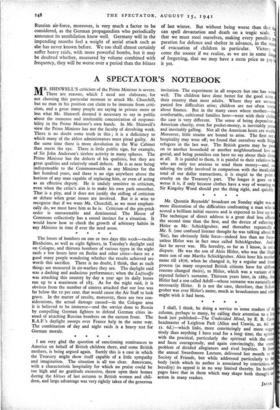I am very glad the question of sanctioning remittances to
America on behalf of British children there, and some British mothers, is being argued again. Surely this is a case in which the Treasury might show itself capable of a little sympathy and imagination. The situation is all too clear. Americans, with a characteristic hospitality for which no praise could be too high and no gratitude excessive, threw open their homes during the blitzes of last autumn to British women and chil- dren, and large advantage was very rightly taken of the generous invitation. The experiment in all respects but one has wor well. The children have done better for the good name their country than most adults. Where they are unaccet panied few difficulties arise; children are not often worn about finance. But in the many cases where mothers—fr, comfortable, cultivated families here—went with their childt the case is very different. The sense of being dependent American charity, even for pocket-money, is inevitably preeser and inevitably galling. Not all the American hosts ore wealth; Moreover, little strains are bound to arise. The first zest hospitality may wear off; we found that ourselves with Belp refugees in the last war. The British guests may be pas on to another household or another neighbourhood less cer genial, and being penniless can have no say about their dest at all. It is painful to them, it is painful to their relatives h who are only too anxious to send them money—and, c sidering the trifle involved in comparison with the incalcula total of our dollar transactions, it is stupid to the point cruelty on the Treasury's part. The longer it goes on worse it is, if only because clothes have a way of wearing o Sir Kingsley Wood should put the thing right, and quickly.
* *


























 Previous page
Previous page